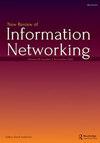Introduction
Q2 Social Sciences
引用次数: 0
Abstract
Our December issue of New Review of Information Networking (NRIN) represents a time of transition to a new Editor (I’m happy to join NRIN) and a space for refocus on networks of information across the many contexts of library & information science, social media, and higher education. The first article, Sümeyye Akça’s Access beyond borders: Linked Open Data applications on cultural heritage, explores the role linked open data (LOD) applications play in the work of cultural memory institutions. With the goal of making collections more discoverable and searchable collections more visible and primed for web-based discovery, Akça draws attention to the many considerations of successfully deploying LOD technologies. Qixiang Wu and Lin He extend the theme of discovery to their work with topic clustering in microblogging, Research on Multi-tag Propagation Clustering Method for Microblog Hot Topic Discovery. With a multi-labelpropagation approach to recommendation algorithms, the team shares ideas for improving the process for connecting users with relevant topics in public opinion. In A study of the effect of hybrid English teaching by teachers using MOOC mode, Zhiming Liu explores hybrid English teaching practices in Massive Open Online Courses (MOOC) learning environments. With a focus on evaluating student learning and engagement, consideration is given to the impact of “learning networks design” to effective educational processes. Shifting the lens from student achievement to faculty performance, Xueqiang Wang’s Research on the evaluation methods of English teaching quality in the context of online education shares a back-propagation neural network (BPNN) method of evaluating online teaching quality. The automation model shared is one step on the road to the application of automation to challenges of quality in online teaching. From the articles in our December issue, it is evident that many researchers working communities connected to NRIN have taken steps toward confronting the challenges of scaling dimensions of discoverability, recommendation activities, and online education. Each of the articles address these issues as they navigate networks of cultural heritage, social media, and distributed learning. As always, if you are engaged in research exploring networks of information, NRIN would love to hear from you. Our Instructions for Authors outline the topics and process for submitting an article for review. If you have questions or wish to bounce ideas off the editor, please review our Aims and Scope and feel free to contact me at the e-mail address below. We particularly NEW REVIEW OF INFORMATION NETWORKING 2022, VOL. 27, NO. 2, 69–70 https://doi.org/10.1080/13614576.2022.2161265介绍
我们12月份的《信息网络新评论》(New Review of Information Networking, NRIN)代表了新编辑(我很高兴加入NRIN)的过渡时期,也是重新关注图书馆与信息科学、社交媒体和高等教育等众多背景下的信息网络的空间。第一篇文章,s meyye aka的《跨越国界的访问:文化遗产的关联开放数据应用》,探讨了关联开放数据(LOD)应用在文化记忆机构工作中的作用。为了使集合更容易被发现,更容易被搜索,并为基于web的发现做好准备,aka提请注意成功部署LOD技术的许多考虑因素。吴其祥和何林将发现的主题扩展到他们的微博话题聚类研究中,《微博热点话题发现的多标签传播聚类方法研究》。通过推荐算法的多标签传播方法,该团队分享了改进将用户与公众舆论中的相关主题联系起来的过程的想法。刘志明在《MOOC模式下教师混合式英语教学效果研究》中,探讨了MOOC学习环境下的混合式英语教学实践。以评估学生的学习和参与为重点,考虑“学习网络设计”对有效教育过程的影响。王学强的《在线教育背景下英语教学质量评价方法研究》将视角从学生成绩转移到教师绩效,分享了一种基于反向传播神经网络(BPNN)的在线教学质量评价方法。共享的自动化模型是将自动化应用于网络教学质量挑战的一步。从我们12月份的文章中可以明显看出,许多与NRIN相关的研究人员已经采取措施应对可发现性、推荐活动和在线教育的扩展维度的挑战。每篇文章都在文化遗产、社交媒体和分布式学习的网络中解决了这些问题。和往常一样,如果你正在研究探索信息网络,NRIN很乐意听到你的声音。我们的作者说明概述了提交文章进行审查的主题和过程。如果您有问题或希望向编辑反馈意见,请查看我们的目标和范围,并随时通过以下电子邮件地址与我联系。《信息网络新评论2022》第27卷第2期。2,69 - 70 https://doi.org/10.1080/13614576.2022.2161265
本文章由计算机程序翻译,如有差异,请以英文原文为准。
求助全文
约1分钟内获得全文
求助全文
来源期刊

New Review of Information Networking
Social Sciences-Education
CiteScore
2.10
自引率
0.00%
发文量
2
期刊介绍:
Information networking is an enabling technology with the potential to integrate and transform information provision, communication and learning. The New Review of Information Networking, published biannually, provides an expert source on the needs and behaviour of the network user; the role of networks in teaching, learning, research and scholarly communication; the implications of networks for library and information services; the development of campus and other information strategies; the role of information publishers on the networks; policies for funding and charging for network and information services; and standards and protocols for network applications.
 求助内容:
求助内容: 应助结果提醒方式:
应助结果提醒方式:


